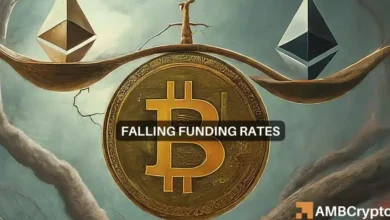1 Stock I Wouldn’t Touch With a 10-Foot Pole — and Here’s Why

[ad_1]
This company’s challenges are just too hard to ignore.
With the stock market at record highs, you’d think that the vast majority of companies would be thriving. However, this just isn’t the case, as there is a wide range of outcomes from businesses in all different industries.
Consequently, some companies flat-out continue to struggle mightily with no end in sight, even though the economy has remained resilient. Here’s one business that fits this category that I wouldn’t touch with a 10-foot pole. And I don’t think you should, either.
Struggling with growth and profitability
Shares of Peloton Interactive (PTON 2.67%) currently trade 98% off their peak price, a milestone achieved in January 2021. While this was one of Wall Street‘s hottest stocks during the pandemic, it has since become one of the most disappointing. And this is due to ongoing challenges that don’t appear to be getting resolved anytime soon.
Let’s start with demand. Peloton is having a hard time boosting its revenue. During the fiscal 2024 third quarter (ended March 31), the business reported sales of $718 million, which was down 4% year over year. This marked the ninth straight three-month period that a drop was registered, clearly not an encouraging sign. And that figure was significantly lower than three years before in Q3 2021.
It’s not a shock to anyone that after economies started to open back up and consumer behavior normalized, Peloton would experience a slump. In other words, demand was probably pulled forward. That’s understandable, and it’s something a lot of internet-enabled businesses saw at the time.
But what’s truly alarming is that Peloton just hasn’t recovered. Its connected-fitness subscriber base is plateauing, indicating how difficult it has been to sell more of the company’s expensive exercise equipment. And this is despite launching a bike rental program in 2022, as well as entering into distribution agreements with e-commerce juggernaut Amazon and brick-and-mortar retailer Dick’s Sporting Goods.
And the business remains in terrible financial shape. While driving top-line growth is clearly a huge problem, Peloton’s survivability is in question. It doesn’t appear close to posting a profit anytime soon.
The net loss came in at $167 million in the latest fiscal quarter. The new management team has embarked on sizable cost cuts, which is the right move. However, it’s anyone’s guess when things will turn around.
A high-risk situation
A reasonable investor might still consider buying shares in this troubled enterprise. Peloton’s market cap of $1.2 billion is less than half its trailing-12-month revenue of $2.7 billion. These shares have gotten so beaten down that it’s impossible to find any ounce of optimism as we look toward the future. Deep-value investors, particularly those with a certain level of comfort with high-risk situations, might take a chance on Peloton.
I’m not one of those people. I don’t have the skill set to accurately predict when, or if, Peloton will get on the right track. And I’ll gladly pass on the stock.
What I’ve learned by observing Peloton over the past few years is that it’s best to focus on identifying businesses that consumers can’t live without. What would happen if Peloton simply didn’t exist anymore? Sure, some of the company’s most loyal customers would be upset. But there are an unlimited number of ways to work out that the void would be easily filled.
On the other hand, think about Alphabet or Visa, for example. They are so vital to our day-to-day lives that we can’t imagine our world without them. Peloton doesn’t belong in this elite group. And that’s another reason I won’t touch the stock with a 10-foot pole.
Suzanne Frey, an executive at Alphabet, is a member of The Motley Fool’s board of directors. John Mackey, former CEO of Whole Foods Market, an Amazon subsidiary, is a member of The Motley Fool’s board of directors. Neil Patel and his clients have no position in any of the stocks mentioned. The Motley Fool has positions in and recommends Alphabet, Amazon, Peloton Interactive, and Visa. The Motley Fool has a disclosure policy.
[ad_2]
Source link




